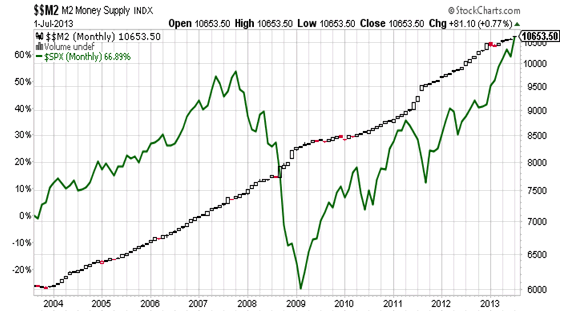Real Reason Why Fed’s Easy Money Isn’t Helping the Stock Market in the Long Term
Stock-Markets / Stock Markets 2013 Jul 30, 2013 - 10:18 AM GMT George Leong writes: I tell you, Federal Reserve chairman Ben Bernanke is risking the future of America with his free-flowing don’t-worry-about-the-future-generations strategy of pumping money into the economy. The problem, as I have said many times previously, is that people and companies have become so accustomed to the cheap money that the tapering to come will surely be difficult.
George Leong writes: I tell you, Federal Reserve chairman Ben Bernanke is risking the future of America with his free-flowing don’t-worry-about-the-future-generations strategy of pumping money into the economy. The problem, as I have said many times previously, is that people and companies have become so accustomed to the cheap money that the tapering to come will surely be difficult.
The Federal Reserve has pumped so much money into the system, but the problem is that gross domestic product (GDP) growth continues to be downright ugly. But Bernanke will be leaving the Federal Reserve in the next year for some plump speaking gigs, directorships, and other lucrative deals. He will be leaving behind a massive debt on the central bank’s balance sheet and a struggling economy. I really feel bad for the future generations who will inherit this debt. After witnessing what the Federal Reserve has done, it’s no wonder the youth of today don’t trust the governments.
The scary thing is the lack of GDP growth. Remember, as we all learned in Economics 101, that GDP is the combination of consumption, investment, government spending, and net exports.
We all know the governments are not spending, given their massive debts. Look at what happened to Detroit, a government that spent but failed to budget correctly. This will have an impact on GDP growth.
Yet the really major issue is the consumption portion of GDP growth. By this I mean the spending by consumers, which accounts for about two-thirds of America’s GDP.
What is happening is that despite the crazy-low interest rates and massive bond buying, consumers are just not spending to the degree the Federal Reserve had hoped.
As shown on the chart below, the amount of money (M2) pumped into the economy has steadily risen since 2004, as shown by the black line. Take a closer look and notice the correlation between the M2 and the S&P 500, with the exception of 2007–2009, when the Great Recession hit. You have to wonder what will happen if the Fed starts to pull back on the M2 money supply.

Chart courtesy of www.StockCharts.com
More importantly, the Federal Reserve is struggling as the spending rate, or the “velocity,” of money is continuing to be lackluster, which is affecting GDP growth. Simply put, for each dollar pumped into the system, the number of times that dollar is spent again is low.
The flat velocity of money is a real problem that is making the Federal Reserve’s money pumping ineffective. The fact is consumers need to spend at much higher rates.
Given this, GDP growth could continue to be flat moving ahead as Bernanke leaves his position at the Federal Reserve to the next Wall Street “yes man.” You might want to have in place an exit strategy for when the stock market starts to stumble—which isn’t just yet, but it’s coming.
This article The Real Reason Why the Fed’s Easy Money Isn’t Helping the Stock Market in the Long Term was originally published at Investment Contrarians
By George Leong, BA, B. Comm.
www.investmentcontrarians.com
Investment Contrarians is our daily financial e-letter dedicated to helping investors make money by going against the “herd mentality.”
George Leong, B. Comm. is a Senior Editor at Lombardi Financial, and has been involved in analyzing the stock markets for two decades where he employs both fundamental and technical analysis. His overall market timing and trading knowledge is extensive in the areas of small-cap research and option trading. George is the editor of several of Lombardi’s popular financial newsletters, including The China Letter, Special Situations, and Obscene Profits, among others. He has written technical and fundamental columns for numerous stock market news web sites, and he is the author of Quick Wealth Options Strategy and Mastering 7 Proven Options Strategies. Prior to starting with Lombardi Financial, George was employed as a financial analyst with Globe Information Services. See George Leong Article Archives
Copyright © 2013 Investment Contrarians- All Rights Reserved Disclaimer: The above is a matter of opinion provided for general information purposes only and is not intended as investment advice. Information and analysis above are derived from sources and utilising methods believed to be reliable, but we cannot accept responsibility for any losses you may incur as a result of this analysis. Individuals should consult with their personal financial advisors.
Investment Contrarians Archive |
© 2005-2022 http://www.MarketOracle.co.uk - The Market Oracle is a FREE Daily Financial Markets Analysis & Forecasting online publication.



